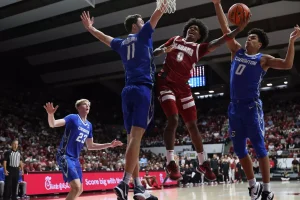Opinion | Join a credit union, not a bank
March 1, 2023
I proudly do all of my banking with a credit union, and you should, too.
College is when many young adults first begin to control their own finances: getting their first credit cards, opening personal bank accounts, getting part-time jobs and paying their own rent. It’s vitally important to carefully weigh all of your options when making financial decisions, including choosing what type of institution you want to bank with.
Credit unions are alternatives to traditional banks, collectively owned by the people who maintain accounts with them. After opening an account with one, you maintain a balance equal to the value of a share, typically between $5 and $25, representing your partial ownership of the credit union.
A “normal” bank is a private business owned by investors naturally thinking about nothing except maximizing their profits. Market competition in combination with the incentives of private ownership results in hiked interest rates on the loans you take out, minimized interest paid on your savings and pointless fees and barriers.
Credit unions, as nonprofits that are responsible to their members, use profits to save you money instead of funneling the interest you’re paying towards wealthy plutocrats. Their profits are used to reduce interest on loans that members take out and pay more interest on members’ savings.
On average, credit unions charge around 10% less interest (about 1.3%) on credit cards compared to banks. They also offer more interest on certificates of deposit and charge less interest on mortgages. If you took out a mortgage on a $400,000 home with a 20% down payment, you would save, on average, over $4,000 just by using a credit union instead of a bank.
Credit unions are great examples of American democracy being applied to the economy. Every credit union’s board of directors is elected “by and from the members.” That is to say, members elect their fellow members to supervise, advise and direct the credit union.
The best Americans have always stood for popular sovereignty and “the consent of the governed” against arbitrary rule. President Franklin Roosevelt, in the acceptance speech for his first renomination, denounced “economic royalists” for amassing control over “other people’s property, other people’s money, other people’s labor—other people’s lives.”
How much of your day-to-day life is dictated by your access to money? Over the course of your life, you’ll have to deal with overdraft fees, pay virtually criminal interest rates on student debt and credit cards, and obsequiously beg for the opportunity to slowly pay off a thirty-year mortgage.
Democratically elected directors, not Roosevelt’s economic royalists, possess “the ultimate responsibility for [credit unions’] direction and control.” A credit union places power over your personal finances back in your hands. There’s nothing more American than that.
If you aren’t satisfied with the way that your credit union is being managed, you are always able to run for a directorship and actually change it. If you have an account with a traditional bank and have issues with its management, you can only resort to lodging toothless complaints or suffering through the rigmarole of switching banks.
Both well-tested and proven, credit unions are no novel financial experiment. The Federal Credit Union Act was first signed by President Roosevelt in 1934 and over 130 million Americans already maintain accounts with credit unions.
Credit unions have the same financial protections for account holders that banks do. The Federal Deposit Insurance Corporation insures $250,000 of deposits per bank account and the National Credit Union Administration does the exact same thing for all federally-insured credit unions. If your credit union ever goes out of business, your money is just as safe as it would be in a bank.
It is important to note that you can’t necessarily join any credit union you see. Members of a specific credit union are required to be linked by a certain field of membership.
Membership requirements might be something like holding a specific job, being a member of a certain organization or living in a given area. Alabama Credit Union, which maintains a branch in the University of Alabama Student Center, allows anyone living in or with substantial ties to any of 21 Alabama counties to become a member.
It’s not just that you personally save money when you keep an account with a credit union. Your money is being loaned out to help members of your community: your coworkers, your neighbors, your grocers, your religious leaders and your friends. Keeping an account with a credit union instead of a bank is a great way to make your community a better place to live without lifting a finger.
Martin Luther King Jr. advocated for forming a credit union to protect members of the Ebenezer Baptist Church from economic vultures. He pointed out that “actually when the individual makes a loan from the Credit Union of which he is a member, he is borrowing from himself.”
King elegantly identified the simple beauty of the credit union. As you are both the owner and the customer, you always know that the owners have your best interests at heart.
Lots of financial decisions are incredibly complex. The decision of whether to have your money managed by people looking to make a quick buck off of you or by your peers whom you voted into office shouldn’t be one of them.
If you’re interested in joining a credit union, the National Credit Union Association maintains an online Credit Union Locator where you can find any number of credit unions within walking or driving distance. If you’re already a member of a credit union, pay a bit more attention to the next board of directors election and maybe even consider throwing your hat in the ring.










